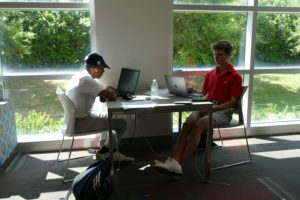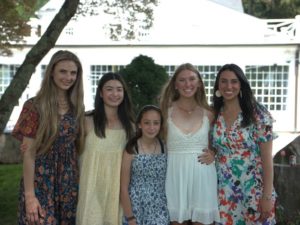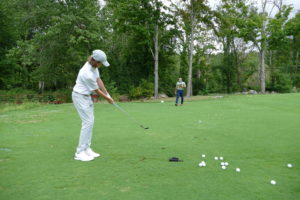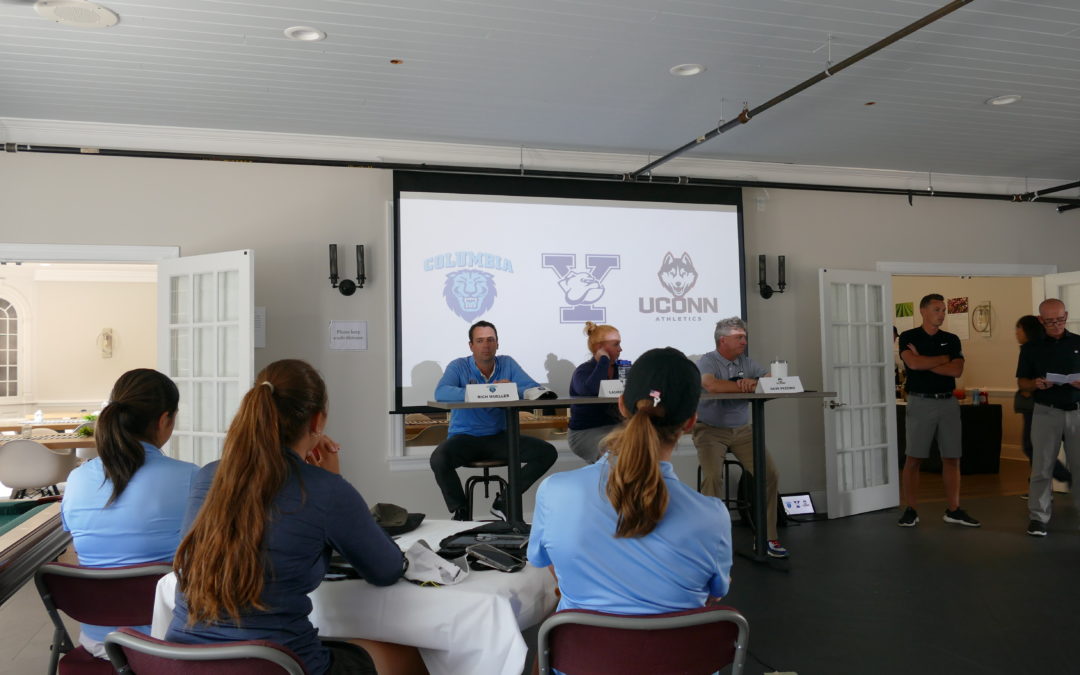There are 8 Ivy League schools, though Brown does not have a women’s or men’s golf program and Cornell does not have a women’s golf team. While the Ivy League has their own golf championships, they compete against other schools during their regular seasons.
Here are the remaining options for the best college golf teams in the Ivy League (in alphabetical order):
- Columbia
- Cornell (men only)
- Dartmouth
- Harvard
- Penn
- Princeton
- Yale
If you’re interested in pursuing a roster spot at an Ivy League school, below are some criteria to consider.
1. Academics Play a Large Role in the College Golf Recruiting

As elite institutions, it is no surprise that Ivy League schools place a heavy emphasis on academic excellence in their admissions process.
The student body at each Ivy League school falls under a categorization called the Academic Index (AI), which is a combination of standardized testing scores and GPA. As prospective student-athletes, all recruits must hit a minimum score before admittance to the college. The dean of each institution personally reviews each student-athlete applicant to ensure the AI is met.
There is some give-and-take with the AI, as each team has to hold a certain average score. If your personal Academic Index is slightly lower than your future teammates’ but your golf scoring average is better, the coach can argue that a balance is met. At the end of the college golf recruiting process, it’s up to the admissions committee if you’ll be on the team or not.
Ivy League schools use the Academic Index for two main reasons: to maintain their academic record and to ensure the recruit can thrive during their experience. If a prospective student-athlete struggles academically in high school, throwing rigorous college classes on top of a time-consuming golf schedule can make both the student and the team suffer. Being on academic probation and potentially losing eligibility from a low college GPA is a lose-lose situation.
2. A Unique College Golf Recruiting Process
There are plenty of policies and practices going on behind the scenes of the Ivy League college golf recruiting process that make it quite different from other NCAA schools.
We already saw that academics play a large role, and while some other coaches also have to put their prospects up for academic review with their institutions’ admissions committee, Ivy League school deans make the ultimate decision on their student-athletes.
Limited Roster Spots

Another differentiating factor is that Ivy League schools have a set number of roster spots to recruit for each year depending on the number of sports they offer, and each sport or team is awarded a certain allowance.
The team must then stay the same size, meaning most college coaches try to keep their number of recruits coming in each year the same to maintain a consistent rolling four-year total.
Written Commitment

The Ivy League Schools do not use the National Letter of Intent (NLI) to lock in your commitment (and a college golf scholarship) to their institution. They use what’s called a Likely Letter, and they are usually sent to recruits between October 1st and March 15th of their senior year of high school.
Between the academics and limited roster spots, you’ll see college golf coaches often recruiting the same players, making this a very competitive environment. The Likely Letter is a way to tell their recruits that they’ll likely receive admission to the college and be on the team, but they do have to apply first and gain approval from the dean.
Ivy League golf coaches only want to give Likely Letters to those who are truly committed to their institution because if a recruit receives more than one, the coach may have to scramble to fill his or her last spot. This may lead to pressure to apply early to certain institutions.
3. Ivy League Golf Scholarships
Like NCAA Division 3 schools, Ivy League schools do not offer college golf scholarships. While Ivy League golf scholarships do not exist, you can earn academic scholarships or grants and apply for financial aid.
4. College Golf Season at an Ivy League School
With the Ivy Leagues located in the Northeast, weather is an important factor when considering golf season length. Winters last a long time up north, and depending how far north your school is, your spring season may not start until April.
If you want to compete – or at least be able to practice – year-round, a school in the southern half of the U.S. may be a better fit. If you’re looking to enjoy a college golf experience while also earning your degree from an elite institution, the Ivy League would be a great place to spend four years.
Are Ivy League Schools Right for You?

The process to play golf in college is a long one, and talking to Ivy League coaches is simply a different college golf recruiting process experience. No matter where you’re hoping to play, academics, roster spots and college golf scholarships are all factors to consider, both for you and for college coaches.
Your priorities will help you determine if an Ivy League school is right for you, and thinking about the academic implications early will give you ample time during high school to focus on your classes and extracurriculars. As you continue the college golf recruiting process, you may be surprised to find your priorities change, and that’s okay – trust the process, and you’ll end up exactly where you’re supposed to be.



